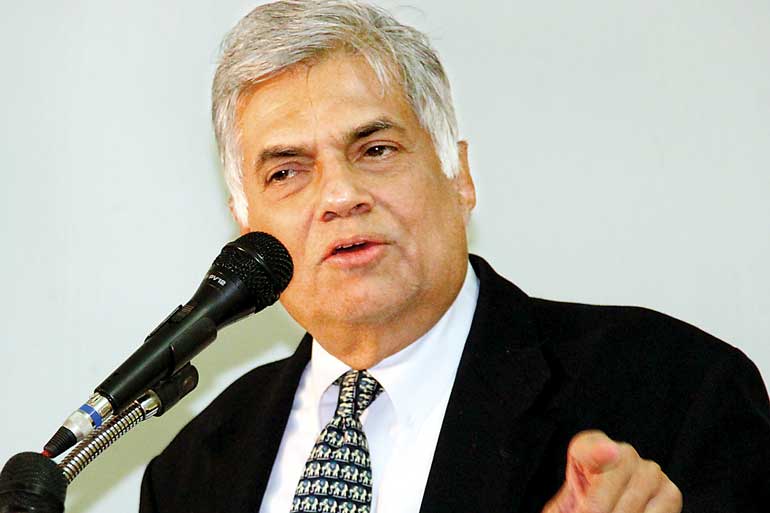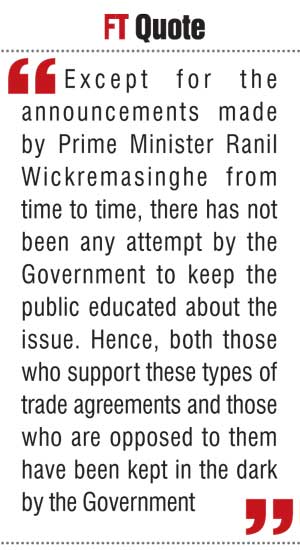Monday Feb 23, 2026
Monday Feb 23, 2026
Monday, 15 February 2016 00:00 - - {{hitsCtrl.values.hits}}

Prime Minister Ranil Wickremesinghe
Linking Sri Lanka to the global market
The proposed Economic and Technological Cooperation Agreement or ETCA has been one of the crucial economic reforms which the Government is planning to introduce, according to the Government, to deliver the promised prosperity to Sri Lankans.
 It had not been specifically mentioned as a policy by name in the manifesto which the ruling United National Party had presented to the electorate in August 2015 coaxing voters to vote it to power. However, the ETCA can be considered as one of the programs under the main economic strategy outlined in the manifesto to deliver prosperity to people. That main economic strategy consists of linking Sri Lanka to the global economy and to do so, making Sri Lanka globally competitive.
It had not been specifically mentioned as a policy by name in the manifesto which the ruling United National Party had presented to the electorate in August 2015 coaxing voters to vote it to power. However, the ETCA can be considered as one of the programs under the main economic strategy outlined in the manifesto to deliver prosperity to people. That main economic strategy consists of linking Sri Lanka to the global economy and to do so, making Sri Lanka globally competitive.
Produce for a market that is bigger than that of Sri Lanka
What was meant by linking Sri Lanka to the global economy was further elaborated by the Prime Minister in his economic policy statement delivered in Parliament in November 2015. He said that Sri Lanka should produce for a “market bigger than the domestic market” indicating that Sri Lanka’s markets should be ‘enlarged’.
To attain that target, he proposed to enter into trade agreements with “India and China”. The reason for singling out these two countries for having bilateral trade relationships has been due to their fast economic growth accompanied by an equally fattening middle class with an appetite for Sri Lanka’s products.
Further, by regaining GSP+ concessions, he expressed the hope of entering the European markets as well. He had also opined that Sri Lanka should look into the possibility of partnering with Trans-Pacific Partnership Agreement, commonly known as TPPA, signed by the Pacific-rim countries recently. That agreement has enabled countries like Vietnam to get extra benefits for its garment exports, a competitor for Sri Lanka’s threatened garment industry. Partnering with TPPA is to open up all the Pacific-rim countries for Sri Lanka’s international trade.
Hence, ETCA is only one item on the long list of bilateral trade agreements which Sri Lanka is planning to sign in the period to come.
Fear of Indian professionals flooding Sri Lanka’s job markets
ETCA has received wide condemnation of and protest by local professional bodies, especially those representing the engineering, medical, accounting and legal fields. Their charge is that it is a gross sell-out of Sri Lanka to India.
The fear expressed by these professional bodies is that the ETCA will enable Indians to flood the local professional markets. Such an inflow of India professionals, it is claimed, would threaten the jobs of those who are currently employed and deny job opportunities to those yet to be born.
However, the real fear which is not spoken of in public is something else. That is the fear of facing competition and the fear of losing the current income levels. This is specifically a serious problem in the case of accountants, lawyers and engineers who are in excess supply in the local market today. If Indians come to the local professional markets, their income levels would be driven down pretty fast. This fear is understandable because it is these professional competencies which have promised the local youth to help climb the social ladder – known as social mobility – and enjoy the fruits of their sacrifice of time, money and energy in acquiring those competencies.
Hence, naturally, they would have objections to the ETCA if they fear that it will shatter their dreams.
Strange information silence on the ETCA by the Government
Though the ETCA has become a crucial issue in economic policymaking in Sri Lanka today, local economists have chosen to keep mum on it. The reason would have been the total ‘information silence’ which the Government has maintained about the issue.
Except for the announcements made by Prime Minister Ranil Wickremasinghe from time to time, there has not been any attempt by the Government to keep the public educated about the issue. Hence, both those who support these types of trade agreements and those who are opposed to them have been kept in the dark by the Government.
The website of the Department of Commerce is totally silent on ETCA (visit: http://www.doc.gov.lk/web/). There has not been a website or at least a Facebook page for the two leading ministries concerned, namely, the Ministry of National Policy Planning and Economic Affairs under the Prime Minister or the Ministry of Development Strategies and International Trade under Minister Malik Samarawickrama.
In this background of total information silence by the Government, it is not strange for local economists too to keep silent on the issue. The only exception has been Rohan Samarajiva, who has written a few articles in Sinhala to the local website Yukthiya (www.yukthiya.lk). Even Samarajiva has discussed the issue in general terms without referring to specific provisions in the proposed agreement relating to the ETCA.
GMOA setting an example of how websites should be operated
 Against this backdrop of Government inactivity, it is heartening to see that the Government Medical Officers Association or GMOA, a critic of the ETCA, has developed a rich webpage on the ETCA accessible through its main website (available at: http://www.gmoa.lk/index.php/2015/12/indo-sri-lanka-economic-and-technology-cooperative-agreement-etca/).
Against this backdrop of Government inactivity, it is heartening to see that the Government Medical Officers Association or GMOA, a critic of the ETCA, has developed a rich webpage on the ETCA accessible through its main website (available at: http://www.gmoa.lk/index.php/2015/12/indo-sri-lanka-economic-and-technology-cooperative-agreement-etca/).
The distinguishing feature of this webpage is that it has posted all the information relating to the ETCA, both supporting and critical, so that readers can make their own judgment on the issue after perusing all the postings.
It is ironic that when the Government has maintained total silence on the ETCA issue, the first draft of the agreement prepared by Sri Lanka’s negotiating team for submission to its counterparts in India and updated up to 12.01.2016 has been published by the GMOA on its webpage (available at: https://drive.google.com/file/d/0B-5I1TzwvAHObGh3QTREQk9Zd2FtV25xMnU5bzNIMDJOa2dj/view).
This is a professional approach to an issue since it gives options to readers. It appears that the Government, in its communication strategy, has to learn a lesson or two from one of its severe critics, namely, the GMOA.
UPM demanding the right to participate in economic policymaking
The ETCA has been such a burning issue for Sri Lankan professionals that it has brought 11 professional bodies under a single umbrella called the United Professionals’ Movement or UPM against ETCA, according to the GMOA webpage. That includes all known professions in Sri Lanka, namely, government medical doctors, lawyers, engineers, management accountants, statisticians, computer experts, architects, personnel managers plus the umbrella outfit called the Organisation of Professional Associations or OPA.
Though the UPM has taken to the streets against the ETCA, its objectives have not been to fight against the ETCA per se. As pronounced in the webpage under reference, it seeks to establish good economic policy governance in Sri Lanka specifically in three areas, which are also the main ingredients of the good governance package being promoted by the present Government. Hence, as far as the objectives are concerned, there cannot be any objection to the UPM from the Government’s side.
The three key principles which the UPM is agitating for establishing in Sri Lanka are the following: getting professionals involved in the policy development processes relating to international trade agreements, formulating house rules, regulations and policies for all professions in Sri Lanka and forcing the Government to make Indo-Sri Lanka cooperation agreements public.
In other words, what it demands from the Government is not to leave such vital trade agreements entirely in the hands of bureaucrats and politicians and maintain transparency in what the Government does in this area by ending the strange information silence which it practises at present.
These objectives set by the country’s established professional organisations call for the establishment of a regular and continuous consultation process in economic policymaking.
Economic consultation is a must today
Such a consultative process is a must in terms of the good economic policy governance necessary for ensuring the success of policies. It not only gives an opportunity for policymakers to get diverse views from a wider segment of society but also helps them to assign ‘policy ownership’ back to society.
This would not have been necessary or relevant 50 years ago when societies were not concerned about good governance principles, transparency, disclosure policies and right of the people to information.
For instance, the Mahaweli Project that required inputs from a diverse assembly of experts was accelerated by the Government in early 1980s without such wide consultation. As such, the physical engineering of the project was a success, but the human and economic engineering involving the settlement of farmer families, improving their knowledge base and connecting them to markets locally as well as globally has failed. In the recent past, the development of the mega infrastructure projects such as the Hambantota Harbour and Mattala Airport were engineering marvels; but since the due consultative process was not pursued by the previous government in this connection, they have become economic failures imposing enormous costs on the current and future taxpayers.
Once views are known, abandon or modify policy
This issue was addressed by this writer in a previous article in this series under the title ‘Delivering economic democracy will lead to controversy unless it is defined properly’ (available at: http://www.ft.lk/article/472845/Part-II--Delivering-Economic-Democracy-will-lead-to-controversy-unless-it-is-defined-properly).
This is what this writer said in the article under reference relating to the need for continuous consultation on policies: “This calls for introducing suitable mechanisms to have wide consultations on economic policies that are being implemented by the Government. That applies to micro-level policies as well as to macro-level policies. In the case of micro-level policies, people who have a stake in that policy should necessarily be given an opportunity to express their views on the policy. Once these views are known, the policy could be abandoned completely if there is wide public opposition to it or implement it with suitable modification having taken the public views into consideration. At macro-level, even the monetary policy being implemented by the Central Bank should come under this public scrutiny. In the present circumstances, the Central Bank implements its policies ex parte without giving a chance for people who are affected by its policies to express their views on them”.
Having recognised the practical difficulty in introducing such a consultative process, the article under reference recommended the need for empowering civil society organisations as follows: “But one difficulty that may be encountered in a wide public consultation is the diversity of views of people and their ability to make a logical evaluation of Government’s economic policies. It will also be costly and time consuming to have a wide public consultation. To overcome these problems, two mechanisms could be suggested. One is to allow civic society organisations to represent the public. The other is to use the social media to gauge the views of the public on the policies being proposed. When the internet penetration becomes universal in the country, it will not be difficult to seek the views of the people on economic policies through social media.”
The UPM is such an organised civil society organisation and the Government should not ignore its cry for being consulted in policymaking.
Indo-Lanka Free Trade Agreement
The ETCA has been the natural evolution of the Indo-Lanka Free Trade Agreement or ILFTA, signed in 1998 and implemented from 2000. The ILFTA has promoted bilateral trade between Sri Lanka and India, despite the claims of the critics to the contrary.
Under the ILFTA, the trade of visible goods between India and Sri Lanka was to be promoted taking advantage of the specialities which each country had in different lines of production. For instance, India has the advantage in producing drugs and machinery and so Indian producers could sell their products to Sri Lankans at reduced duty rates offered by the Sri Lanka Government.
Similarly, Sri Lanka could sell in the Indian market, say, spices and garments in which Sri Lanka had speciality in production again at reduced duty rates offered by the Indian Government.
Growth of trade with India under ILFTA
The track record of the ILFTA shows that the two countries have indeed made satisfactory progress toward the realisation of both these objectives. In 1999, Sri Lanka’s total trade with India consisting of imports from and exports to India amounted to $ 545 million. This trade volume shot up by more than four times to $ 2401 million in 2005 and, even in the gloomy foreign trade scenario that prevailed after 2008, the total trade amounted to $ 2,142 million in 2009. In 2014, it was $ 4,648 million.
Trade gap with India has narrowed
The narrowing of the trade gap between Sri Lanka and India was much more prominent during this period. In 1999, when Sri Lanka exported one unit to India, it had to import 11 units from India.
By 2014, this ratio fell nearly by half enabling Sri Lanka to export one export unit to India and restricting imports from that country only to six import units, still much better than what it was in 1999.
The critics have used the growth in the trade deficit with India in absolute terms over these years to belittle its significance. But they have ignored the fact that during this period, the total trade of Sri Lanka has grown significantly along with the country’s increase in the total economic output. As such, India was a negligible trade partner in 1999. But in 2014, India was number one source of imports for Sri Lanka and number three export destination followed by the US and the UK.
Trade surpluses with all countries are not the objective of trade
The critics of the ILFTA appear to be under the belief that Sri Lanka should necessarily have a trade surplus with all the countries with which it conducts international trade. This need not be the case. Trade surpluses occur with any particular country or a region depending on the type of goods which Sri Lanka exports and imports.
For instance, Sri Lanka has huge trade surpluses with the US, the UK and the EU. This is because Sri Lanka exports much of its garment and textile products to these three regions. But conversely, Sri Lanka has high trade deficits with India, China and Japan because it meets most of its industrial product needs from these three countries. Thus, the objective of international trade should be to promote trade among countries.
Accordingly, aspiring to have trade surpluses with all the countries in the world should not be the objective of international trade.
CEPA was the natural evolution of the ILFTA
The success story relating to the ILFTA led both Sri Lanka and India to explore the possibility of having a wider international trade relationship between the two countries. This led both countries to get together and propose a comprehensive economic partnership agreement or CEPA in 2004.
The Rajapaksa Government that came into power in 2005 decided to shelve CEPA without looking at the beneficial effects which it promised to bring in. ETCA is a modified form of CEPA that had been abandoned by the Sri Lanka Government a long time ago.
The criticisms levelled against both CEPA and the ETCA need be closely evaluated weighing evidence for and against them carefully. That would be the subject matter of the next few articles in this series.
(W.A Wijewardena, a former Deputy Governor of the Central Bank of Sri Lanka, can be reached at [email protected])